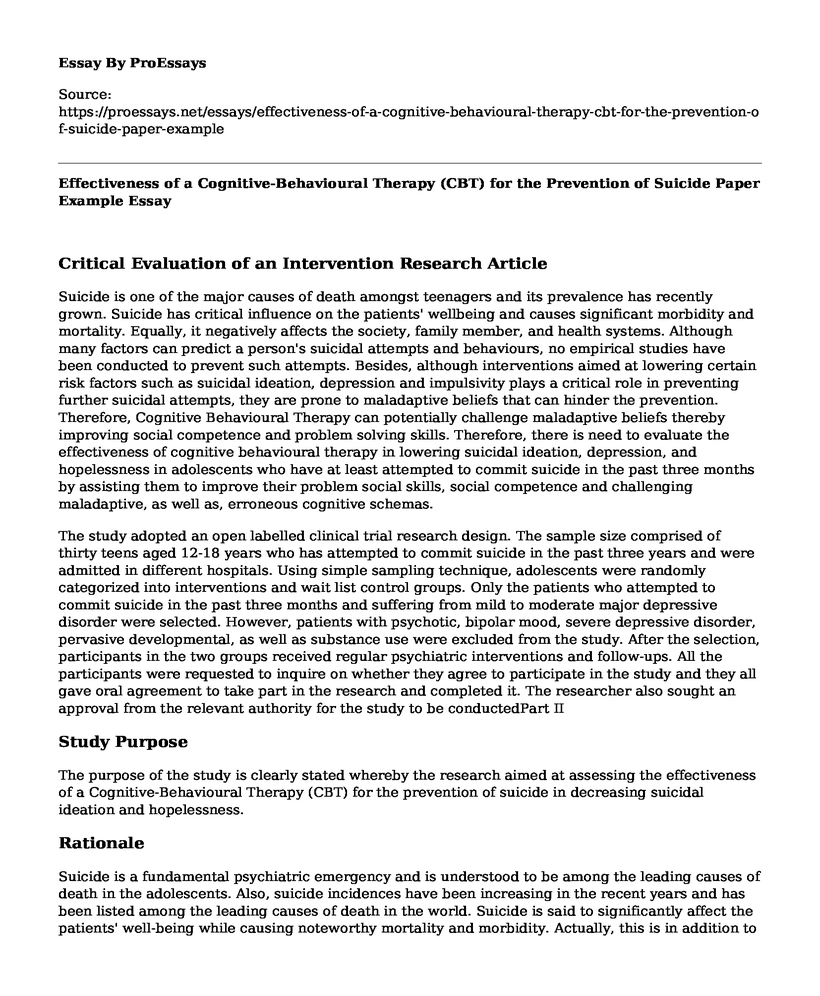Critical Evaluation of an Intervention Research Article
Suicide is one of the major causes of death amongst teenagers and its prevalence has recently grown. Suicide has critical influence on the patients' wellbeing and causes significant morbidity and mortality. Equally, it negatively affects the society, family member, and health systems. Although many factors can predict a person's suicidal attempts and behaviours, no empirical studies have been conducted to prevent such attempts. Besides, although interventions aimed at lowering certain risk factors such as suicidal ideation, depression and impulsivity plays a critical role in preventing further suicidal attempts, they are prone to maladaptive beliefs that can hinder the prevention. Therefore, Cognitive Behavioural Therapy can potentially challenge maladaptive beliefs thereby improving social competence and problem solving skills. Therefore, there is need to evaluate the effectiveness of cognitive behavioural therapy in lowering suicidal ideation, depression, and hopelessness in adolescents who have at least attempted to commit suicide in the past three months by assisting them to improve their problem social skills, social competence and challenging maladaptive, as well as, erroneous cognitive schemas.
The study adopted an open labelled clinical trial research design. The sample size comprised of thirty teens aged 12-18 years who has attempted to commit suicide in the past three years and were admitted in different hospitals. Using simple sampling technique, adolescents were randomly categorized into interventions and wait list control groups. Only the patients who attempted to commit suicide in the past three months and suffering from mild to moderate major depressive disorder were selected. However, patients with psychotic, bipolar mood, severe depressive disorder, pervasive developmental, as well as substance use were excluded from the study. After the selection, participants in the two groups received regular psychiatric interventions and follow-ups. All the participants were requested to inquire on whether they agree to participate in the study and they all gave oral agreement to take part in the research and completed it. The researcher also sought an approval from the relevant authority for the study to be conductedPart II
Study Purpose
The purpose of the study is clearly stated whereby the research aimed at assessing the effectiveness of a Cognitive-Behavioural Therapy (CBT) for the prevention of suicide in decreasing suicidal ideation and hopelessness.
Rationale
Suicide is a fundamental psychiatric emergency and is understood to be among the leading causes of death in the adolescents. Also, suicide incidences have been increasing in the recent years and has been listed among the leading causes of death in the world. Suicide is said to significantly affect the patients' well-being while causing noteworthy mortality and morbidity. Actually, this is in addition to the negative consequences that suicide has on the members of the family, society and health systems. Based on these facts, the study was conducted to evaluate the effectiveness of CBT in bringing down suicidal ideation and hopelessness. Specifically, the study focused on adolescents whose ages fall between 12 and 18 and who had previously experienced a suicidal attempt.
Connection to existing knowledge
The study connects well with the works of other researchers whose studies examined the high frequency with which depressive disorders occur among adolescents leading to suicidal attempts. Also, according to the existing literature, suicide is a leading cause of death among adolescents; it is estimated that about 9% of people belonging to this age group have had a suicidal attempt at least ones. Further, previous studies have ranked suicide third in the leading causes of death in the United States. Moreover, suicide attempts have been primarily attributed to hopelessness in depressed patients which leads to suicidal ideation and ultimately resulting in a suicidal attempt. The current study is grounded on these facts from existing literature whereby the researchers seek to evaluate the effectiveness of CBT as a method that can be used to eradicate the suicide problem.
Cite this page
Effectiveness of a Cognitive-Behavioural Therapy (CBT) for the Prevention of Suicide Paper Example. (2022, Jul 06). Retrieved from https://proessays.net/essays/effectiveness-of-a-cognitive-behavioural-therapy-cbt-for-the-prevention-of-suicide-paper-example
If you are the original author of this essay and no longer wish to have it published on the ProEssays website, please click below to request its removal:
- Cultural Relevance of Mental Health Patient Navigators for Ethnic Minority Groups
- Hero Character Archetype Essay
- Essay on Effects of Social Media on Adolescents
- Personality and Self-Concept Essay
- Maslow Hierarchy of Needs, McGregor Theory and Herzberg Two Factor Theory
- Theory X & Y: Human Work Inspiration & Management - Essay Sample
- John's Recurrent Depression: A Perfectionist's Undue Burden - Essay Sample







